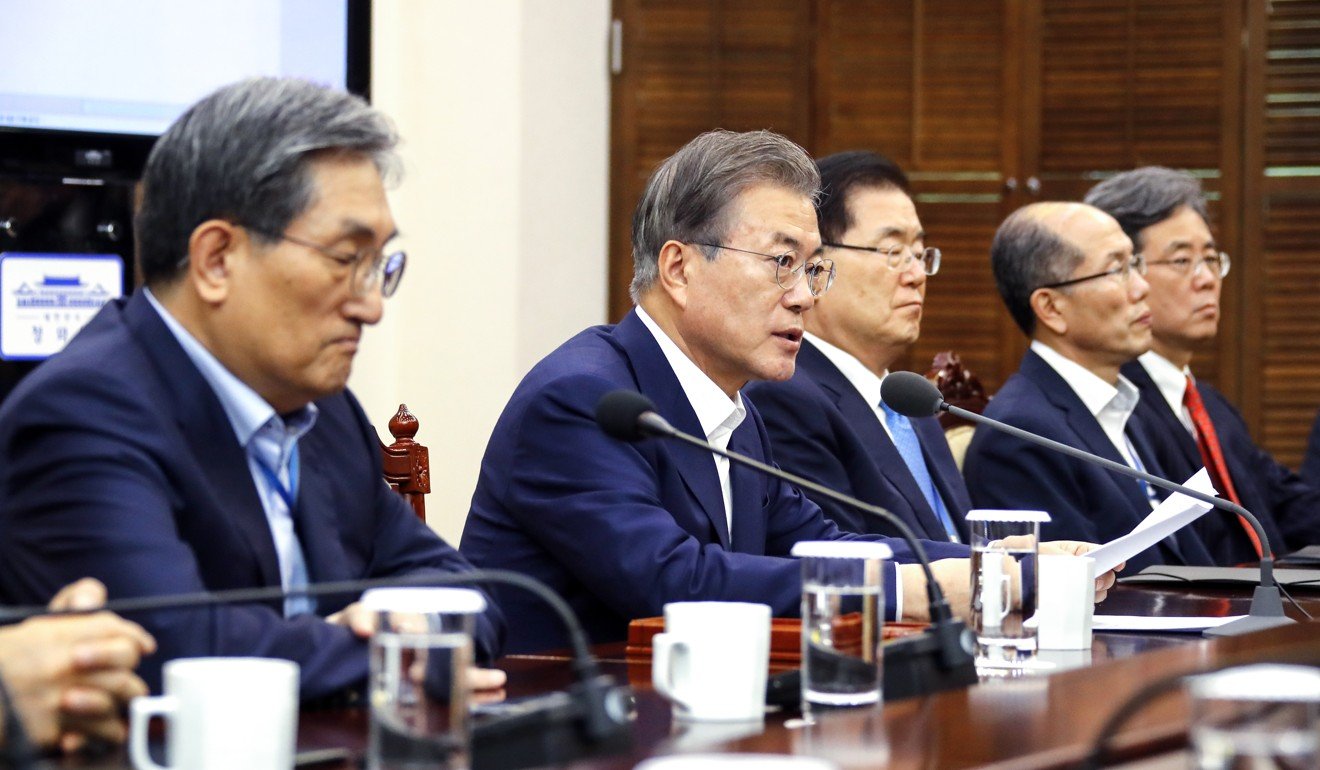
South Korea braces for more export curbs as Moon Jae-in warns of ‘greater damage’ to Japan’s economy
- Tokyo could next week remove Seoul from its ‘white list’ of trusted trade partners and impose curbs on a further 40 categories of products
- The escalating trade spat between the closely intertwined Asian neighbours has also raised concerns over a disruption in the global supply chain
Officials from the two countries made no progress in talks last Friday, leading Japan’s Ministry of Economy, Trade and Industry to suggest it could remove South Korea from the list of 27 preferred trading partners, which would require Japanese firms to obtain additional export verifications before selling to South Korean buyers. The Japanese government’s decision is expected to be announced on July 24 and would take effect 21 days later following a review process.
The 40 categories of products include isostatic presses, frequency changers, pressure transducers, titanium alloys, carbon fibre, vacuum pumps, generators, gyroscopes, crane trucks and milling machines.
Japan-South Korea ‘trade war’: has Tokyo shot itself in foot?
Within those broad categories, the Korea Strategic Trade Institute estimated about 1,100 specific items could be subject to the new restrictions, according to the Korea Times.
South Korean President Moon Jae-in on Monday struck a defiant tone, warning Japan it was “breaking the frameworks of Korea-Japan economic cooperation that has been built upon mutual reliance and reciprocal benefits over the past half-century”.

Bilateral ties have also been strained by divisive historical issues after South Korean court rulings ordering Japanese companies to compensate victims of wartime forced labour.
“Japan’s regulations on the white list cover a comprehensive list of items based on the arbitrary standards for national security concerns, adding uncertainties to Korean companies,” researcher Kim Gyu-pan said in a report by the state-run Korea Institute for International Economic Policy.
“Hi-tech chemical materials and lithium-ion batteries, which are used in military applications, as well as some machine tools could be subject to fresh export curbs by Japan.”
I warn that in the end, there will be greater damage to the Japanese economy
The escalating trade spat between the closely intertwined Asian neighbours has also raised concerns over a disruption in the global supply chain because South Korean chip makers, including Samsung and SK Hynix, account for more than 70 per cent of the global memory chip output.
Moon pledged South Korean firms, which have scrambled to identify alternative suppliers to reduce disruptions, would succeed in diversifying their sources.
“I warn that in the end, there will be greater damage to the Japanese economy,” he said at a meeting of his top aides.
Robert Dujarric, a professor of international relations at the Tokyo campus of Temple University, said both sides were “talking tough” and their refusal to back down was cause for concern.
“[But] neither side wants a full-blown trade war and both sides do realise that it will hurt their economies,” he said.
Explained: the legacy of war in Asia
Dujarric also suggested that even if Japan went ahead with the new restrictions it could mitigate the impact by targeting items less critical to South Korea or by not enforcing the restrictions so tightly.
Japan has demanded South Korea respond to its proposal for a third-party arbitration panel to address the forced labour issue by Thursday.
Bong Young-shik from the Asan Institute for Policy Studies said the South Korean government could explore a compromise proposal acknowledging Japan’s position that compensation claims arising from Japan’s period of colonial rule on the Korean peninsula had already been fully settled.
“However, its hands are tied as any gesture yielding to Japanese pressure would spark a political backlash,” Bong said.

Meanwhile, industrial machinery manufacturer Hitachi Zosen, one of the Japanese companies ordered to compensate wartime labourers, has reportedly shut down its operations in South Korea.
In January, the Seoul High Court ordered the company to pay 50 million won (US$42,400) in compensation to a Korean plaintiff who sued for being forced to work for the company between September 1944 and August 1945.
Lawyers for Hitachi Zosen argued the period during which compensation could be awarded had expired but the court found in favour of the plaintiff, who had originally demanded 120 million won.
Any gesture yielding to Japanese pressure would spark a political backlash
Analysts have predicted Japanese companies are likely to reconsider their presence in the South Korean market in light of the courts’ compensation rulings. Any decision to withdraw could be accelerated if the current trade dispute deepens and more local consumers boycott Japanese products and services.
On Monday, dozens of South Korean small business owners rallied in the South Korean capital calling for boycotts of Japanese consumer goods to protest Tokyo’s export curbs.
During Monday’s protest, Kim Sung-min, president of the Korea Mart Association, urged shop owners to boycott the distribution of Japanese products until Tokyo apologised and changed course.
Additional reporting by Associated Press and Reuters


